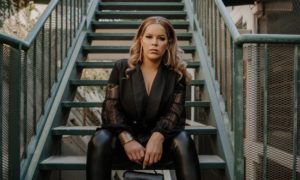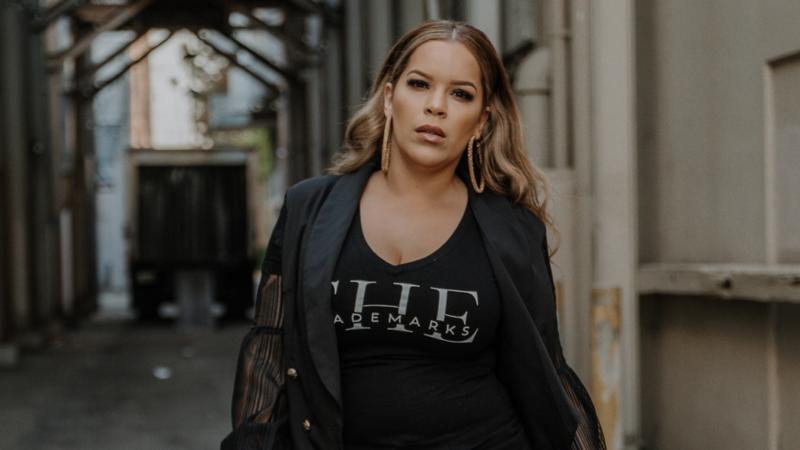As women’s rights are currently under attack, one woman is trailblazing in her field and showing women how to overcome inequality. Attorney Reonna Green transitioned from being a hairstylist to an attorney, and the journey was an interesting one.
At the start of her career as a prosecutor, she said she adopted the legal professional attire consisting of grey and navy blue suits, beige shirts, and nude pumps. Some judges even required that she wear pantyhose with her skirts. Green said she also had to be mindful of the color of her nails. But she resented the standards and felt she was diluting a version of herself to appear in court.
However, when she established her firm, she leaned into her differences. She embraced her love of bold hoops, vibrant lip color and outfits, which helped attract a professional beauty clientele that felt open to working with her.
“For me, it helps being my authentic self. It helps me resonate with them because they don’t want to hire a stuffy attorney, who makes them nervous, or doesn’t understand their profession or what they do. So it’s like a level of relationship building,” she told Blavity.
“I would say about the hoops about the bold lips, who makes these rules anyway, for corporate America? A lot of the things that I would say about my particular style, I think, are deep-rooted in history and culture of who I am. Big hoops are a sign and a symbol of [many] minority cultures. That’s something that we always see, that’s something that we love to do, its heritage, its culture. To have this rule that it doesn’t belong in corporate America is just so predated. So I’m trying to shake it up. Now that I can do things my way, I think it’s working,” she added.
When Green was younger, she always wanted to be an attorney; however, after high school she had reached her limit with academia and wanted to concentrate on becoming a cosmetologist. Her school offered a regional occupational program designed for individuals who didn’t wish to attend school and would instead acquire a trade.
“They had cosmetology offered at my school. When I was 15, I started taking Cosmo classes,” Green told Blavity, adding how she reasoned beauty careers being lucrative.
Still, her brother encouraged her to obtain a good education which she took into account.
She ultimately used her beauty skills to pay her way through undergrad.
“I did hair and nails when I was at the University of California, Berkeley, and it was cool,” she said.
Unlike most college students who have to schedule their classes around their jobs, Green had the complete autonomy and flexibility to work and go to classes how she saw fit.

She eventually went to law school in Oklahoma, but her California beauty license didn’t transfer to the state until she provided the correct paperwork. The small stumbling block didn’t stop her, and she continued to style her client’s hair and nails while going through law school. Once she passed the bar, she stopped doing hair even though her heart remained within the beauty industry.

“A lot of my friends are in the beauty industry. One of my very best friends still does my hair. So beauty is always still kind of been there,” she said.
Green, however, credited her brother’s wisdom for pushing her to pursue her law degree.
“I was like, if I’m going to go to school, I’m going to go all the way and go be a lawyer. When I was at Berkeley, I ended up majoring in legal studies. So I don’t know what I would have done with the legal studies degree had I not continued with my education,” she said.
Today, Green heads her firm, She Trademarks, which caters to the beauty profession, and advises her clients to be “proactive, rather than reactive when it comes to the legal side of their business.”
She admits and understands that setting up the legal foundation of a business entity is not as intriguing as hiring a graphic designer to create a business logo and branding or having a business coach to strategize a revenue plan and a website developer to design an alluring landing page. However, business owners must be cognizant of the legal aspect when establishing their commerce method.

“If you don’t get those proper pillars in place, your contracts in place, your business entity, that LLC, your business bank accounts, if you don’t do all that stuff, and something happens, that whole empire, that whole business is going to crumble down with one lawsuit,” she told Blavity.
“Maybe not necessarily as big as a lawsuit but maybe you hire somebody to do a job for your business, but you don’t use contracts, because you do a handshake, you agree in DMS that you’re like, okay, they’re going do this, and then they don’t deliver on your product, and now you’re out five grand or ten grand, how do you recoup that because you didn’t set up proper contracts or proper legal foundation,” she added.
Green offers legal services in the areas of specific business entity formation like LLC formation, which is the simplest business category for entrepreneurs for tax reasons.
“It has the least amount of formalities, as far as minutes are concerned, having things recorded and board meetings. So I’ll help with the formation of that,” Green said, adding that she also composes tailored contracts for a business owner’s particular needs.
“One of the things is to bridge the gap between small business owners and [the] legal [structure]. Because like I said, as small business owners, you’re doing a lot of things, and you have to spend money doing a bunch of different things and legal is on the backburner,” she said.
Green also recognizes that many people view acquiring legal services as costly, so she provides resources for small business owners that prefer to do it themselves. Clients can utilize her contract templates, add their information and then have a complete contract drafted by an attorney with all the necessary clauses.
“If their issue requires something special, there’s the custom contract option,” she said, explaining that she gives her clients training to educate them about certain clauses and how to properly set up a business bank account to protect them against any possible liability.
Despite her immense knowledge and her broad spectrum of expertise, she still has to overcome hurdles in a male-dominated field. She advises that women become proactive in their career journey to reduce the sting of sexism by securing a mentor, developing a thick skin and establishing boundaries.

“The positions of power are typically male occupied, and that creates all kinds of just different struggles, different hurdles. I have worked in corporate, I have worked for the government, I’ve worked in different areas; what I will say is sometimes being equally qualified is not enough,” she said, recalling the level of gender discrimination she’s encountered even when her experience with trials and contractual development is on par with her male peers.
“[If a] new position for a special unit [comes] up, and I might get overlooked, and my male counterpart might get that job. And when it comes down to it, all other things being equal, well, what is the only difference or what would that difference be, right? And it’s, that person is a male, and I’m a female, that has happened to me in the law space,” Green said.
Rather than becoming angered by the blatant inequality, Green has relied on her analytical dexterity to arrive at a more constructive solution.
“So the way that I have dealt with that is instead of being mad about it, I’m like, ‘Okay, well, what am I going to do?’ So that next time if this happens, I’m getting the promotion because you can’t overlook me twice because of [not being] male, right? Okay, I’m going to try more cases. If it was a trial opportunity or I want that next corporate role, I’m going to make sure that I’m getting on every corporate account [and] have that FaceTime with the clients. Kind of really turning back into self and being like, how can I make myself better? How can I make it to where they can’t overlook me for the next promotion?” she said.
Another strategy she employs is locating a mentor, preferably a woman outside of her organization that is on the same trajectory in their career.
“I have a mentor who is getting appointed to the bench, Superior Court, and it’s funny because she left the organization I was in and went to a different organization. When I had questions about trials I was doing, I still called her. She would leave work and meet me for dinner and we’d go over stuff. So you just kind of have to reach out for those opportunities and find mentors where you can, I would say,” she said.
Other components that contributes to her success are her ability to develop thick skin upon entering a field considered a boys club and enforcing her boundaries.
“After you get that thick skin, enforce your boundaries, then fight for your position, fight for the respect that you want, and it is going to be a fight, which is why you have to have the thick skin first. Then continue to better yourself, sharpen your skills, get more exposure, get more experience,” she said.
Once Green quieted the naysayers and established how she should be treated, she demanded her peers’ respect. And now, she wants other women to follow suit and do the same when choosing a career oversaturated with men.
“You deserve the respect because you have all these accolades, you have all this experience, and so, it might be male-dominated, but you [will] dominate within that industry.”

